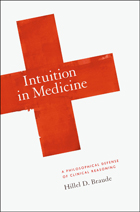
Intuition is central to discussions about the nature of scientific and philosophical reasoning and what it means to be human. In this bold and timely book, Hillel D. Braude marshals his dual training as a physician and philosopher to examine the place of intuition in medicine.

Competent physicians make accurate diagnoses. How are accurate diagnoses made? This readable book gives some important answers to that question. Experienced physicians were presented with diagnostic problems and asked to solve them. Through the use of trained actors serving as “patients” and with a variety of supplementary techniques, the investigators were able to dissect the process by which diagnoses, right and wrong, are made.
Reporting on the most comprehensive investigation of clinical reasoning yet conducted, the authors present data and conclusions of importance not just to medical educators but to anyone interested in the psychology of problem solving. Rigorous attention to methods, thorough grounding in contemporary theories of problem solving, and a healthy respect for the complexity of real-life situations characterize this remarkable study.
A sampling of its salient findings only suggests the richness of this book. Successful diagnosticians begin to form hypotheses almost as soon as they encounter a patient. They entertain a limited number of hypotheses, but these are tested repeatedly during a workup. New findings are treated as confirming, refuting, or not contributing to the solution contemplated; more elaborate schemes based on a knowledge of probabilities are not used. A common error is to relate new information to a working hypothesis, although the information is, in fact, non-contributory. The performance of even an experienced physician varies markedly from case to case. Two of the most important determinants of competence are information and experience; problem-solving skills without a rich supply of facts are insufficient for diagnostic acumen.
READERS
Browse our collection.
PUBLISHERS
See BiblioVault's publisher services.
STUDENT SERVICES
Files for college accessibility offices.
UChicago Accessibility Resources
home | accessibility | search | about | contact us
BiblioVault ® 2001 - 2024
The University of Chicago Press









